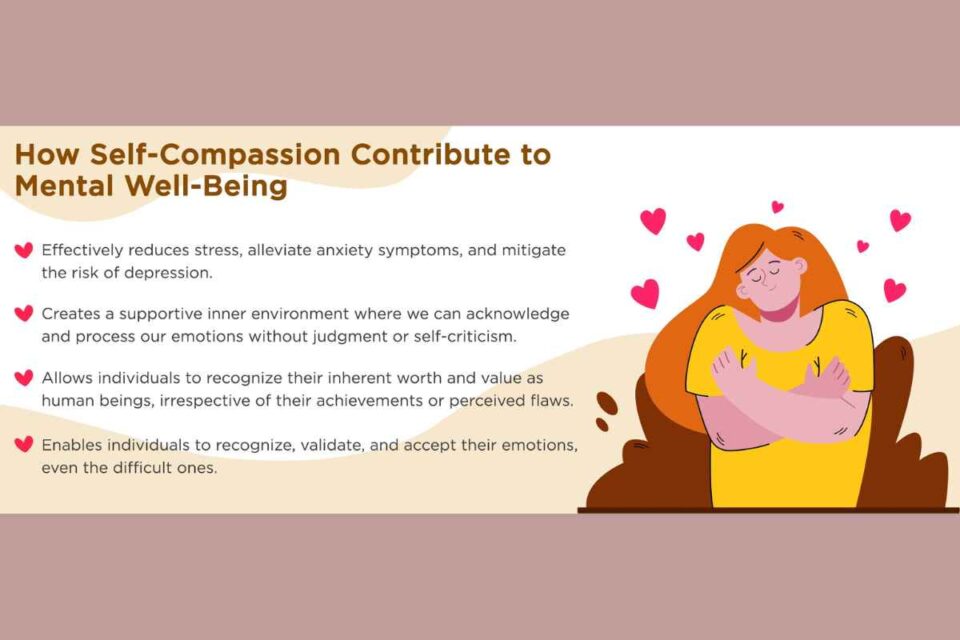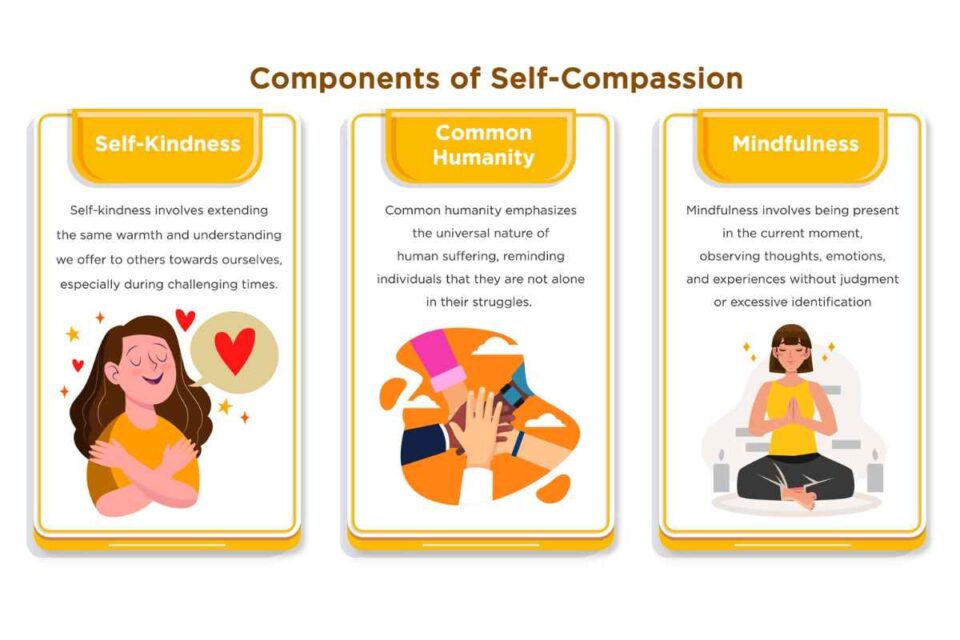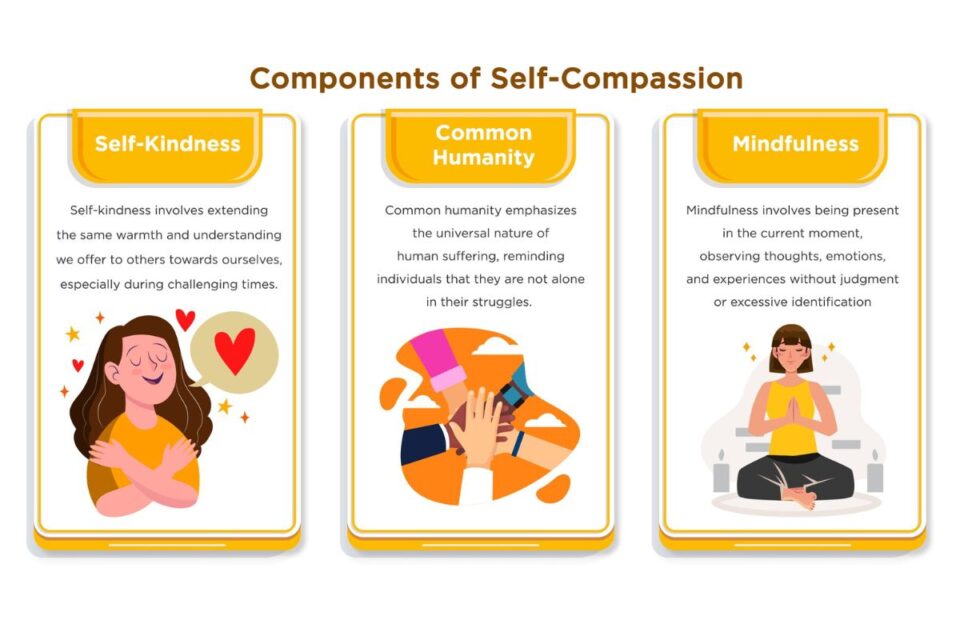June 26, 2023
The Power of Self-Compassion: Building Resilience and Mental Well-Being Through Kindness
Written by Guest Author
Posted in Self Help / Personal Development and with tags: meditation, mental health, resilience, self-compassion

Mental well-being and resilience are essential aspects of leading a fulfilling life.
Self-compassion plays a pivotal role in nurturing these aspects by emphasizing the importance of treating ourselves with kindness, understanding, and acceptance, especially during challenging moments or when faced with adversity.
In the exploration that lies ahead, we delve into the profound essence of self-compassion and its remarkable ability to cultivate resilience and enhance our mental well-being.
By immersing ourselves in this journey, we gain invaluable insights and practical strategies to incorporate self-compassion into our lives, fostering personal growth, emotional well-being, and the ability to navigate life’s challenges with greater effectiveness.

Understanding Self-Compassion
Self-compassion consists of three fundamental components:
- self-kindness,
- common humanity, and
- mindfulness.
Self-compassion stands in contrast to self-esteem, which often relies on external factors for validation.
Instead, self-compassion emphasizes the inherent worth that each of us possesses, regardless of achievements or opinions from others.
It involves embracing our imperfections without harsh self-judgment, cultivating a mindset of self-acceptance and self-love.
A crucial element of self-compassion is acknowledging the shared experience of suffering.
It recognizes that everyone encounters challenges and hardships in life, dispelling the notion that we are alone in our struggles.
By nurturing this understanding, we cultivate empathy towards ourselves and approach our own difficulties with a gentle and compassionate attitude.
Research consistently supports the benefits of self-compassion, demonstrating its positive impact on mental health, emotional well-being, and interpersonal relationships.
The Components of Self-Compassion
Self-kindness
At the heart of self-compassion lies self-kindness, the act of treating oneself with gentleness, empathy, and acceptance.
It involves extending the same warmth and understanding we offer to others towards ourselves, especially during challenging times.
By embracing self-kindness, we acknowledge our inherent worthiness and grant ourselves the compassion we truly deserve.
This compassionate self-care becomes a vital foundation for building resilience and nurturing mental well-being.
Common humanity
An essential element of self-compassion is the recognition of common humanity.
This component emphasizes the universal nature of human suffering, reminding individuals that they are not alone in their struggles.
Acknowledging shared experiences allows individuals to develop a sense of connection and empathy with others.
Recognizing that challenges and hardships are part of everyone’s journey, individuals can cultivate self-compassion by adopting a compassionate perspective that fosters a sense of belonging and transcends self-isolation.
Mindfulness
Mindfulness plays a crucial role in cultivating self-compassion.
It involves being present in the current moment, observing thoughts, emotions, and experiences without judgment or excessive identification.
By practicing mindfulness, individuals can cultivate a non-reactive and non-judgmental awareness of their inner experiences, allowing them to respond to their own suffering with tenderness and understanding.
Mindfulness helps individuals to avoid getting caught up in self-critical or self-deprecating thoughts, enabling them to approach themselves and their experiences with greater compassion.
Developing Self-Compassion
Developing self-compassion is a powerful journey of transformation that entails cultivating a mindset of compassion and fostering a nurturing and empathetic relationship with ourselves. It encompasses several key elements:
- Self-awareness and self-acceptance serve as foundational pillars for self-compassion. It begins with acknowledging our strengths, weaknesses, and areas for growth. By embracing our imperfections without judgment or self-criticism, we create a solid foundation for self-compassion to thrive.
- Mindfulness practices play a crucial role in developing self-compassion. Engaging in activities like meditation and self-reflection allows us to be fully present with our thoughts, emotions, and sensations. By nurturing a state of non-judgmental awareness, we can observe our inner experiences with curiosity and open-mindedness, fostering the growth of self-compassion along the way.
Overcoming barriers to self-compassion requires addressing common challenges such as:
- self-criticism,
- perfectionism, and
- fear of self-indulgence.
It involves cultivating self-acceptance and challenging negative self-talk by replacing it with self-compassionate thoughts and language.
Embracing self-care and practicing self-compassion during difficult moments or when facing perceived shortcomings are integral steps in developing self-compassion.
It’s important to remember that developing self-compassion is an ongoing journey.
Each step taken, no matter how small, brings us closer to a more compassionate and fulfilling life.
By nurturing self-awareness, practicing mindfulness, and overcoming barriers, we actively foster self-compassion, which leads to resilience, personal growth, and improved well-being.

The Role of Self-Compassion in Building Resilience
Resilience refers to the ability to bounce back from adversity and adapt to challenges.
Self-compassion plays a vital role in building resilience by providing a supportive and nurturing mindset.
When faced with setbacks or failures, individuals who practice self-compassion are more likely to respond with leniency rather than self-criticism.
This compassionate attitude fosters resilience and allows individuals to learn from their experiences and persevere.
A case study has demonstrated that self-compassion empowers individuals to develop resilience and overcome obstacles.
Extensive research also highlights self-compassion as a remarkable and influential tool for enhancing our ability to cope with challenges and cultivate resilience.
This invaluable resource has the potential to substantially enhance both our mental and physical well-being.
Self-Compassion and Mental Well-Being

Self-compassion plays a crucial role in promoting mental well-being.
Extensive research has shown that practicing self-compassion can have significant positive effects on our psychological state.
Two research papers investigated the impact of self-compassion training on depression and revealed a consistent pattern of improvement.
Both studies observed a noteworthy reduction in depression symptoms, indicating a significant positive outcome.
Here’s how self-compassion contributes to mental well-being:
- Reducing stress, anxiety, and depression: Practicing self-compassion has been shown to effectively reduce stress, alleviate anxiety symptoms, and mitigate the risk of depression. By extending kindness, support, and self-care to ourselves during difficult moments, we can counteract the detrimental effects of stress and nurture emotional resilience.
- Creating a supportive inner environment: Self-compassion involves treating ourselves with the same love, care, and understanding that we would extend to a friend in need. This compassionate approach creates a supportive inner environment where we can acknowledge and process our emotions without judgment or self-criticism. It fosters self-acceptance and nurtures a positive relationship with ourselves, leading to improved mental well-being.
- Validating emotions and promoting self-acceptance: Self-compassion enables individuals to recognize, validate, and accept their emotions, even the difficult ones. By embracing our feelings without judgment or resistance, we foster self-acceptance and cultivate a healthy emotional landscape. This validation of our experiences promotes psychological well-being and reduces internal conflicts.
- Enhancing overall psychological health: Practicing self-compassion has been associated with various indicators of positive psychological health. It correlates with higher levels of life satisfaction, self-esteem, optimism, and resilience. Self-compassionate individuals are more likely to engage in adaptive coping strategies, have healthier relationships, and exhibit greater psychological flexibility.

The Ripple Effect: Spreading Compassion to Others
Exploring how self-compassion positively influences relationships and interactions:
Cultivating self-compassion brings about transformative changes in our relationships by fostering a deeper sense of self-understanding and acceptance, enabling us to extend genuine compassion and empathy to others.
By treating ourselves with kindness and compassion, we are more likely to offer the same understanding and support to those around us, leading to healthier and more fulfilling connections.
Ways to extend compassion and support to others:
Once we have embraced self-compassion, we can actively extend compassion and support to others.
This can be done through simple acts of goodwill, such as:
- lending a listening ear,
- offering words of encouragement, or
- providing a helping hand.
By practicing empathy, active listening, and acts of compassion, we create a positive impact on the well-being of others, fostering a supportive and caring environment.
Benefits of creating a compassionate community and seeking support:
Being part of a compassionate community and seeking support from like-minded individuals brings forth a multitude of benefits, offering a profound sense of belonging, validation, and mutual empathy.
It creates a space where individuals can share their experiences without judgment and receive support and empathy.
Through collective support, individuals can find solace, gain perspective, and develop resilience together.
Moreover, a compassionate community encourages personal growth, nurtures well-being, and reinforces the value of compassion in all aspects of life.
Practical Tools and Exercises for Cultivating Self-Compassion

Engaging in practical tools and exercises can significantly support the cultivation of self-compassion. Here are some effective methods:
Guided meditations and visualization exercises
Guided meditations specifically tailored for self-compassion can help individuals cultivate a compassionate mindset.
These exercises often involve directing loving-kindness and compassion towards oneself, acknowledging one’s suffering, and offering oneself tenderness and warmth.
Visualization exercises can also be used to imagine receiving compassion and support from a compassionate figure or visualizing oneself as a compassionate and caring presence.
These practices foster a sense of self-acceptance, warmth, and nurturing, promoting the development of self-compassion.
Journaling prompts and reflection activities
Journaling provides an opportunity for self-reflection and exploration of emotions, thoughts, and experiences.
Using specific self-compassion prompts can guide individuals in examining self-critical beliefs, identifying areas where self-compassion is needed, and reframing self-judgment with self-compassionate perspectives.
Reflection activities such as writing gratitude lists or acknowledging personal strengths can also foster self-compassion by shifting the focus towards self-appreciation and positivity.
Self-compassion practices for daily life and challenging situations
Cultivating self-compassion in daily life involves integrating self-compassionate practices into everyday experiences. Some examples include:
- Self-compassionate self-talk: Replacing self-critical inner dialogue with kind and supportive language when facing difficulties or making mistakes.
- Self-care rituals: Engaging in activities that promote self-nurturing and well-being, such as taking breaks, engaging in hobbies, or practicing self-care routines.
- Setting boundaries: Recognizing and honoring personal limits and needs, communicating assertively, and prioritizing self-care and self-compassion.
- Self-compassion breaks: Taking intentional pauses throughout the day to offer oneself moments of self-compassion, where one acknowledges their emotions and offers themselves words of positive affirmations and support.
Overcoming Obstacles and Integrating Self-Compassion into Daily Life:
Developing self-compassion can be accompanied by obstacles and resistance that impede its growth.
The inner critic, self-judgment, and feelings of unworthiness can create challenges in fully embracing self-compassion. Recognizing these barriers and proactively addressing them is vital.
This involves challenging negative self-beliefs, seeking support from trusted individuals or therapists, and consistently practicing self-compassion, even when faced with resistance.
Patience, persistence, and a compassionate approach to the process are crucial in overcoming these obstacles.
To truly benefit from self-compassion, it must be integrated into daily life as a continuous practice.
It goes beyond specific moments or activities and becomes a way of being.
This entails consciously infusing self-compassion into interactions with others, responding to challenges with patience and determination, and granting ourselves grace during difficult times.
Maintaining a heightened awareness of our thoughts, emotions, and reactions allows us to intentionally choose self-compassion as a guiding principle in our actions and decisions.
By committing to a consistent practice, self-compassion becomes ingrained, creating a natural and supportive approach to relating to ourselves and the world around us.

Final Thoughts
The transformative power of self-compassion in building resilience and enhancing mental well-being cannot be overstated.
By embracing and integrating the fundamental elements of self-compassion—self-kindness, recognizing common humanity, and practicing mindfulness—we proactively nurture a compassionate mindset.
Individuals seeking better mental health and self-help must recognize the significance of these concepts, as they bestow empowerment in navigating their personal journeys.
Embracing self-compassion wholeheartedly, treating oneself with love, extending understanding to others, and practicing self-compassion daily are essential actions.
By taking deliberate steps, one can cultivate resilience, enhance well-being, and foster positive relationships, ultimately leading to a more fulfilling and compassionate life.
If you are looking to embrace and integrate the fundamental elements of self-compassion into your life and would like help from our Houston therapists, Montrose therapists, or Sugar Land therapists, get started today.
Why You Feel This Way
Get instant access to your free ebook.
Grounding & Self Soothing
Get instant access to your free ebook.
7 Mood-Boosting Tips
Get instant access to your free ebook.

















